Double wall corrugated pipe
High-density polyethylene (HDPE) has excellent chemical stability , aging resistance and environmental stress cracking resistance. The HDPE double-wall corrugated pipe produced from its raw material is a flexible pipe.

Strong ability to withstand external pressure
The outer wall has an annular corrugated structure, which greatly enhances the ring stiffness of the pipe , thereby enhancing the pipe’s resistance to soil load. In this performance, HDPE double-wall corrugated pipe has obvious advantages compared with other pipes.
Low project cost
Under the same load conditions, HDPE double-wall corrugated pipes only need a thinner pipe wall to meet the requirements. Therefore, compared with solid wall pipes of the same material and specifications, it can save about half of the raw materials, so the cost of HDPE double-wall corrugated pipes is also lower. This is another outstanding feature of this pipe.
Easy construction
Because HDPE double-wall corrugated pipe is light in weight, easy to carry and connect, it is quick to construct and simple to maintain.
Under poor conditions , its advantages are more obvious.
Small friction coefficient and large flow rate
HDPE double-wall corrugated pipes made of HDPE can pass a larger flow than other pipes of the same diameter. In other words, under the same flow requirements, HDPE double-wall corrugated pipes with relatively smaller diameters can be used.
Low temperature resistance and impact resistance
The brittle temperature of HDPE double-wall corrugated pipe is -70℃ . No special protective measures are required during construction under normal low temperature conditions ( above -30℃ ) , which makes construction convenient in winter. In addition, HDPE double-wall corrugated pipe has good impact resistance.
Good chemical stability
Since HDPE molecules have no polarity, they have excellent chemical stability. Except for a few strong oxidants, most chemical media will not damage them. The soil, electricity, acid and alkali factors in the general use environment will not damage the pipe, will not breed bacteria, will not scale, and its flow area will not decrease with the increase of operating time.
long lasting
When protected from sunlight and ultraviolet rays, the service life of HDPE double-wall corrugated pipes can reach more than 50 years.
Excellent wear resistance
Germany has proved through experiments that the wear resistance of HDPE is several times higher than that of steel pipes .
Proper flexure
A certain length of HDPE double-wall corrugated pipe can be slightly bent axially and is not affected by a certain degree of uneven settlement of the ground. It can be laid directly in a slightly crooked groove without pipe fittings , etc.
HDPE double-wall corrugated pipe for drainage is a new pipe made of polyethylene resin as the main raw material, added with an appropriate amount of additives, and extruded. It is suitable for outdoor drainage of buildings and municipal sewage. It has the advantages of light weight, small drainage resistance, high compressive strength, corrosion resistance, and convenient construction. It is an ideal material to replace cast iron pipes and cement concrete pipes .
HDPE structural wall pipe has more economic and social benefits than cement bell-and-spigot pipe
- Greatly shorten the construction period and reduce the construction difficulty
Since HDPE double-wall corrugated pipes are much lighter than cement pipes and are very easy to socket, the construction difficulty is greatly reduced; and the shortest HDPE double-wall corrugated pipe is 6 meters, while the cement pipe is 2.5 meters, which greatly shortens the construction period.
- HDPEdouble-wall corrugated pipe does not have high requirements on the trench bottom.
Since the cement pipe is a steel pipe, in order to ensure the socket effect, the bottom of the ditch must be smoothed, and it is best to lay a foundation layer, and the construction personnel are required to have an absolute sense of responsibility. HDPE double-wall corrugated pipe is a flexible pipe and does not have high requirements on the trench bottom.
- HDPE pipeswill not break despite ground subsidence or crustal changes.
The elongation of HDPE pipe is more than 20 times that of steel pipe and six and a half times that of PVC , but its elongation at break is very high and its ductility is very strong. This means that when the ground sinks or the earth’s crust changes during an earthquake, HDPE pipe can produce resistance deformation without breaking. This is far better than steel pipe and PVC pipe which has obvious brittleness .
- The permeability ofHDPEpipes is much lower than that of cement pipes, less than 2% , and will not cause secondary pollution to groundwater
Cement pipes are inelastic and although they are equipped with rubber rings, the sealing effect is poor. In particular, since cement pipes are heavy and difficult to construct, construction workers simply ignore the effect of the socket, causing the rubber ring to lose its function, thereby increasing the permeability of the pipe.
- HDPEpipe has a long service life, more than 50 years
The safe service life of PE pipes is more than 50 years, which has been proven not only by international standards and the new international, but also by advanced countries. The theoretical service life of cement pipes is 20 years, but as they are silicates, they are corroded by acids and alkalis for a long time, and their service life is greatly reduced. There are examples all over the country where cement pipes have to be replaced within a few years due to sewage leakage, ground subsidence, and joint fractures.
- The inner surface ofHDPEpipe is smooth, does not carry positive or negative charges, and does not scale.
Cement pipes are prone to scaling, which reduces the pipe diameter and affects the flow rate.
- HDPEis light in weight, easy to transport and install, and has no loss.
Cement pipes are heavy, inconvenient to transport and install, and are prone to wear and tear during transportation and installation.
- When the pipeline flow rate, gradient and burial depth are the same,HDPEcan be one or two models smaller than the cement pipe.
The inner surface roughness coefficient of HDPE is 0.009 , and the inner surface roughness coefficient of cement pipes is 0.014 . According to the world-recognized Xie Cai’s law, when calculating the same flow rate , HDPE pipes can be two models smaller than cement pipes.
Application scope
Mainly used in large-scale water transmission, water supply, drainage, sewage discharge, exhaust, subway ventilation, mine ventilation, farmland irrigation, etc. with working pressure below 0.6MPa.
- Municipal engineering: used asdrainage and sewage pipes .
- Construction projects: used as rainwater pipes, underground drainage pipes, sewage pipes, and ventilation pipes in buildings.
- Railway and highway communication equipment: used asprotective tubes for communication cables and optical cables .
- Industry: Widely used in sewage pipes in chemical, hospital, environmental protection and other industries.
- Agricultural garden engineering: used for drainage in farmland, fruit and tea gardens, and forest belts.
- Road engineering: used as seepage and drainage pipes for railways and highways.
- Mine: used as mine ventilation, air supply and drainage pipes.
- Double-wall corrugated pipe with holes: can be used as seepage and drainage pipes for highways in saline-alkali land.
- Golf course and football field projects: used as seepage and drainage pipes for golf courses and football fields.
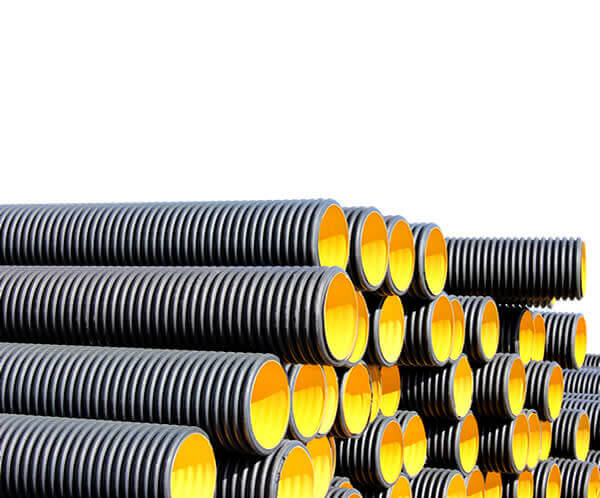
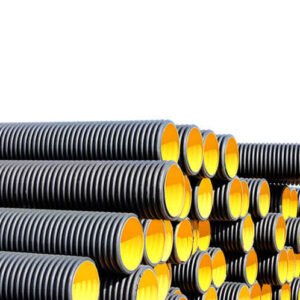
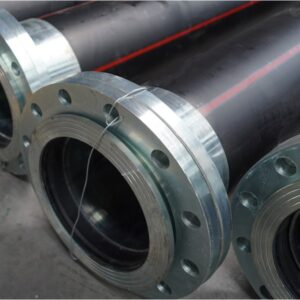
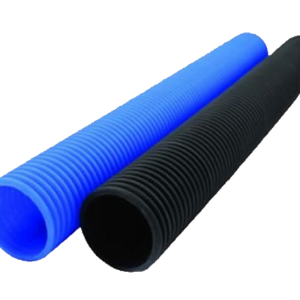

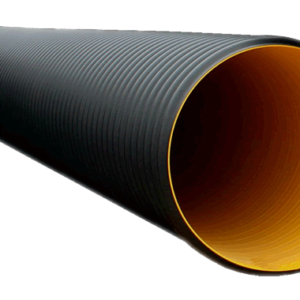
Reviews
There are no reviews yet.